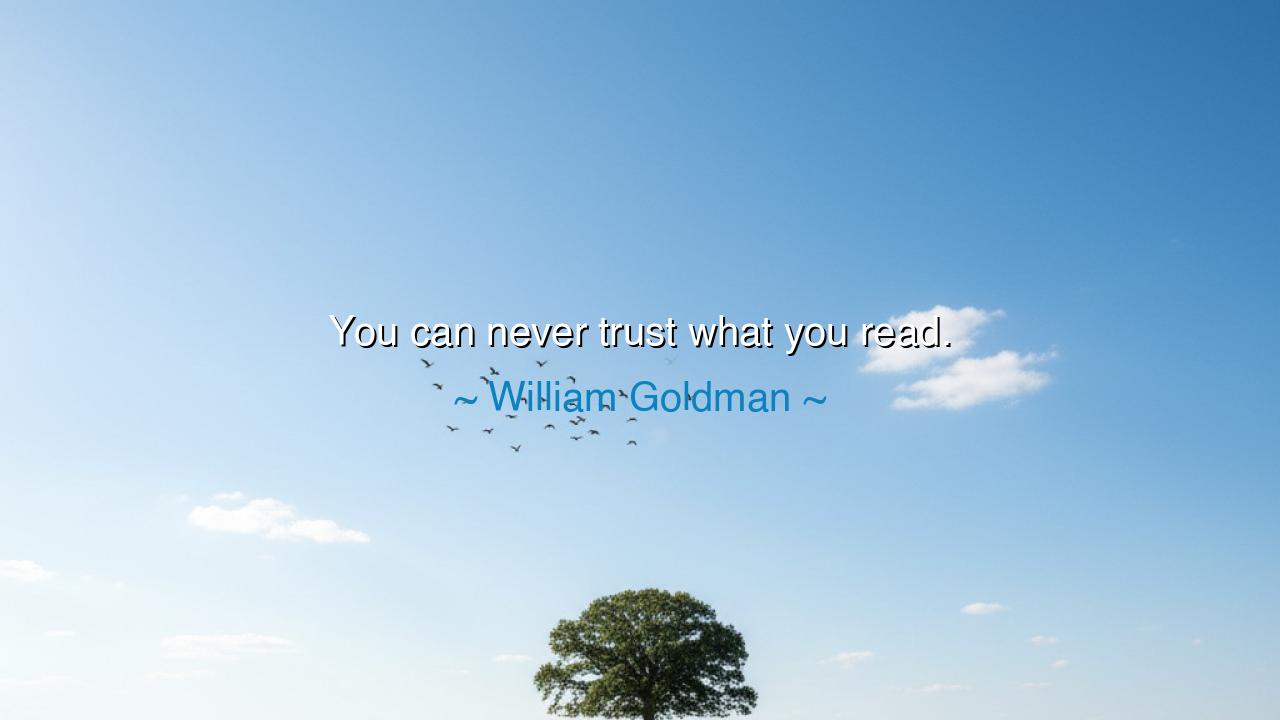
You can never trust what you read.






The words of William Goldman strike like a stern warning from the lips of an elder: “You can never trust what you read.” In this short phrase, he distills the wisdom of centuries, reminding us that written words, though they seem fixed and eternal, are not always vessels of truth. The page may bear ink, but the ink may bear deceit, illusion, or distortion. What is written is not always what is real. This truth is uncomfortable, for we long to find certainty in books, scrolls, and records. Yet Goldman counsels vigilance: question, discern, and do not surrender your judgment to the written line alone.
The ancients knew this danger well. Plato, in his dialogue Phaedrus, warned that writing, though powerful, could weaken memory and deceive the mind. A reader might encounter words without the living voice of their author, unable to question or clarify their meaning. Thus, the written word could become a shadow, a mask, appearing wise yet hiding error. Goldman's wisdom belongs to this lineage, reminding us that while the page may endure longer than speech, it is no less vulnerable to falsehood.
History abounds with examples of this. Kings and emperors commissioned chronicles that glorified their reigns while burying their crimes. Propaganda pamphlets in times of war painted lies as triumphs, ensuring generations grew up on distorted tales. In Nazi Germany, entire populations were swayed by words that bore the mask of reason but the poison of hate. Here we see the power of writing not as neutral tool, but as double-edged blade. The page can liberate or enslave, enlighten or deceive. To read is not to know; it is to enter into contest with another’s voice, which must be measured against reality.
And yet, this saying does not condemn reading itself, but blind faith. Goldman himself, as a master storyteller, knew the art of illusion. He wove tales that entranced, entertained, and provoked—but he also sought to remind us that stories are crafted things, not perfect mirrors of life. Trust is not to be given cheaply. One must always look beyond the words, discerning intent, weighing evidence, and seeking the deeper truth hidden within or beyond the text.
The deeper meaning is that true wisdom is active, not passive. The unwise man reads and believes all; the wise man reads and questions, holding words up to the light of experience and reason. In this sense, the act of reading is not the reception of truth but the beginning of inquiry. The written word becomes a door—but the discerning soul must choose whether it opens into a chamber of truth or a hall of deception.
The lesson is eternal: never surrender your judgment. Respect the written word, but do not worship it. Do not allow the page to think for you. Whether you read scripture, history, poetry, or news, remember that words can conceal as well as reveal. The ancients passed down proverbs, the poets left us verses, the historians left us chronicles—but each must be tested, weighed, and understood in context.
Practical actions follow: when you read, ask who wrote the words and why. Compare sources, seek contradictions, and listen for the silence between lines—the truths left unspoken. Practice discernment, not cynicism, for the goal is not to reject all words, but to see clearly through them. Above all, balance what you read with what you live, for lived experience is the measure by which the written word stands or falls. In this way, you will honor Goldman’s wisdom, guarding your heart and mind against deception, and turning the act of reading into an act of strength.






UGUser Google
Goldman’s statement reminds me of how much we rely on what we read to form our understanding of the world. But does that mean we should always distrust everything? In a way, it’s empowering to think critically about information, but at the same time, it can be overwhelming. Should we ever fully trust a source, or is it always about questioning and verifying? What does that mean for our day-to-day consumption of news and knowledge?
HDNhu Ngoc Huynh Dao
This quote is interesting because it highlights the constant need to question what we read. But is that always practical? In everyday life, there’s only so much time and energy we can devote to verifying every piece of information. Are there areas where it’s still worth trusting what we read, like academic or scientific texts? Or do we risk falling into a perpetual state of uncertainty and doubt?
TPNguyen Thanh Phu
I get the sense that Goldman’s statement is a reflection on how deceptive or misleading things can be, even in what seems like trustworthy content. It makes me wonder, though—do we risk losing faith in all information by applying this level of distrust to everything we read? Could this mindset create more confusion and disconnection rather than fostering informed opinions? How much trust should we place in trusted institutions and sources?
TLNguyen Thi Thanh Lam
Goldman’s quote almost seems like a warning, reminding us to always remain cautious about what we read. But is it healthy to approach every piece of information with suspicion? At some point, we need to trust something to form opinions or make decisions. How do we strike a balance between healthy skepticism and trust, especially in a world where information is so readily available and often conflicting?
TPHOANG DUC TRI PHONG
This quote really resonates in an age where fake news and sensationalized headlines dominate the media. But is there ever a moment when we can trust what we read? What about established sources or books written by credible authors? Maybe the key is to question everything, but also understand which sources have earned our trust. How do we determine what is trustworthy without falling into skepticism about everything?